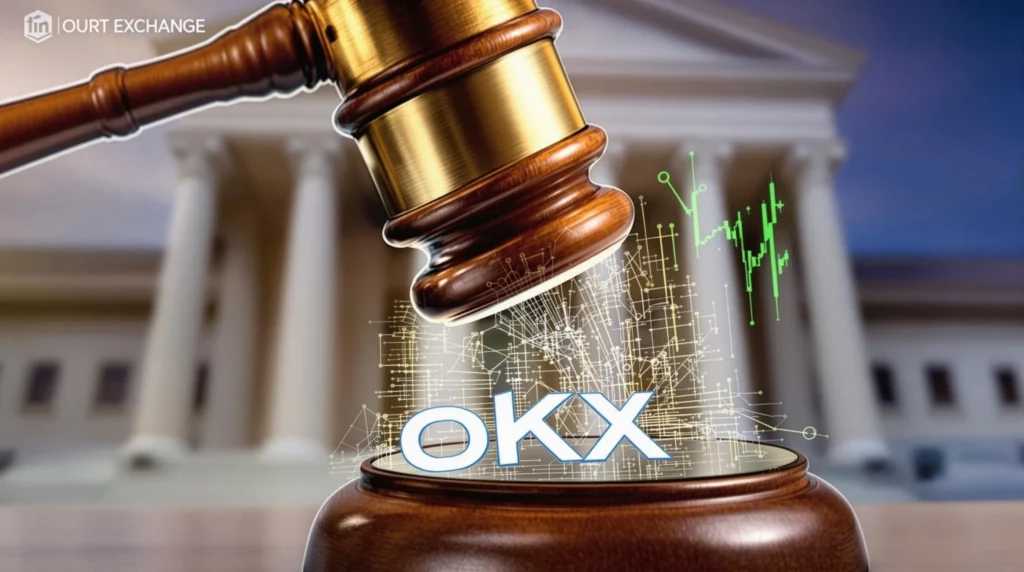Shocking $505M OKX Settlement: Crypto Giant Pleads Guilty to DOJ Charges

In a dramatic turn of events that has sent ripples across the cryptocurrency sphere, major crypto exchange OKX has admitted guilt and agreed to a staggering $505 million settlement to resolve charges brought forth by the U.S. Department of Justice (DOJ). This bombshell announcement highlights the escalating regulatory pressures facing the digital asset industry and serves as a stark reminder of the importance of compliance in the rapidly evolving world of crypto. Let’s dive into the details of this significant development and understand what it means for OKX and the broader crypto landscape.
Unpacking the OKX Penalties: What Led to the $505 Million Fine?
The crux of the issue lies in the operations of OKX’s entity, Aux Cayes FinTech Co. Ltd. According to the DOJ, this entity was found to be operating as an unlicensed money-transmitting business. This is a serious violation, as financial institutions dealing with money transmission are required to be properly licensed and adhere to strict regulatory frameworks to prevent illicit activities like money laundering and terrorist financing.
Here’s a breakdown of the key aspects of the OKX penalties:
- Nature of the Violation: Operating an unlicensed money-transmitting business.
- Entity Involved: OKX’s Aux Cayes FinTech Co. Ltd.
- Settlement Amount: Over $500 million, totaling $505 million.
- Regulator: U.S. Department of Justice (DOJ).
- Impact on OKX: Significant financial repercussions and reputational damage.
This hefty fine underscores the DOJ’s commitment to enforcing regulations within the cryptocurrency space and holding exchanges accountable for compliance failures. It sends a clear message that operating without the necessary licenses and oversight will not be tolerated in the U.S. market.
Delving into the DOJ Charges: Why Were They Brought Against OKX?
The DOJ charges against OKX stem from concerns about the exchange’s compliance with U.S. regulations, particularly those related to money transmission. Operating as a money transmitter in the U.S. requires registration with the Financial Crimes Enforcement Network (FinCEN) and adherence to anti-money laundering (AML) and know-your-customer (KYC) regulations.
The DOJ’s investigation likely uncovered deficiencies in OKX’s compliance program, leading to the conclusion that the exchange was facilitating money transmission without proper licensing. This could involve:
- Lack of Proper Registration: Failing to register with FinCEN as a money service business (MSB).
- Inadequate AML/KYC Procedures: Insufficient measures to verify customer identities and monitor transactions for suspicious activity.
- Facilitation of Illicit Activities: Unintentionally or intentionally enabling the movement of funds linked to illegal activities due to compliance gaps.
While the specifics of the DOJ’s findings are yet to be fully disclosed, the severity of the penalty suggests significant compliance lapses on the part of OKX. This case serves as a critical example for other crypto exchanges to rigorously review and enhance their compliance frameworks.
The Ripple Effect: Understanding the Implications of Crypto Regulation
The OKX settlement is not just an isolated incident; it’s a significant marker in the ongoing evolution of crypto regulation globally. Governments and regulatory bodies worldwide are increasingly focused on bringing the cryptocurrency industry under established financial frameworks. This push for regulation is driven by several factors:
- Investor Protection: Ensuring that users of crypto platforms are protected from fraud, market manipulation, and other risks.
- Financial Stability: Mitigating potential risks to the broader financial system posed by the growing crypto market.
- Combating Illicit Finance: Preventing the use of cryptocurrencies for money laundering, terrorist financing, and other illegal activities.
- Tax Compliance: Ensuring that crypto transactions are subject to appropriate taxation.
The OKX case highlights that regulators are not just talking about compliance – they are actively enforcing existing laws and regulations within the crypto space. This heightened regulatory scrutiny is expected to continue and intensify, shaping the future of the cryptocurrency industry.
Navigating the Future: What Does This Mean for OKX and Other Exchanges?
For OKX, this settlement marks a costly but necessary step towards resolving its regulatory challenges. Paying the $505 million fine is a significant financial hit, but it also allows the exchange to move forward and focus on strengthening its compliance infrastructure. Moving ahead, OKX will likely need to:
- Enhance Compliance Programs: Invest heavily in building robust AML/KYC and regulatory compliance systems.
- Seek Necessary Licenses: Obtain all required licenses to operate legally in various jurisdictions, including the U.S.
- Improve Transparency: Increase transparency in its operations and communications with regulators and users.
- Rebuild Trust: Work to regain the trust of its user base and the broader crypto community.
For other cryptocurrency exchanges, the OKX case serves as a wake-up call. It underscores the critical importance of prioritizing regulatory compliance from day one. Exchanges must proactively engage with regulators, implement strong compliance programs, and ensure they are operating within the legal boundaries of each jurisdiction they serve. Failure to do so could result in severe penalties, reputational damage, and even the risk of being shut down.
Conclusion: A Turning Point for Crypto Compliance?
The $505 million OKX penalties and guilty plea represent a pivotal moment for the cryptocurrency industry. It is a clear indication that regulatory scrutiny is here to stay and is intensifying. While the fine is substantial, it also presents an opportunity for OKX to learn from its mistakes, strengthen its foundations, and emerge as a more compliant and trustworthy platform.
For the broader crypto market, this case reinforces the message that compliance is not optional – it’s essential for long-term sustainability and growth. As crypto regulation continues to evolve, exchanges and other crypto businesses must adapt and prioritize building a compliant and responsible ecosystem. The OKX settlement is a powerful reminder that navigating the regulatory landscape is no longer a choice, but a necessity for survival and success in the dynamic world of digital assets.









